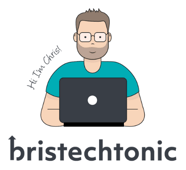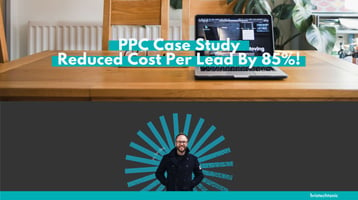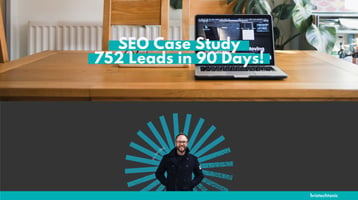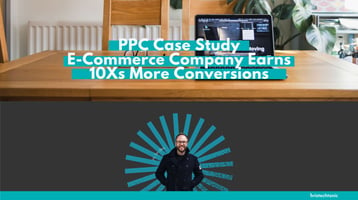In this PPC case study we will show you how we took an existing campaign, dropped the lead cost by...
Healthcare & Medical PPC Case Study
In this case study, you’ll learn how we were able to reduce cost per lead by 60%+ in a highly competitive industry and scale the campaigns to £20k+ per month.
Want to know how we did it?
Let’s get into it!
Background
This client is in the Drug & Rehab treatment industry. They help individuals recover from drug & alcohol addictions with in-stay treatments that last 30-90 days.
Attending one of these programs is very expensive, but often insurance will cover some of the cost.
To give you an idea of the costs (and customer value), on average, a rehab centre can bring in ~£1,000 per night per patient and an average in-stay rehab program is 30 days, bringing in approximately £30,000.
In this situation, we can have a high CPA (Cost Per Acquisition) and still be profitable.
They came to us to reduce their Cost Per Lead and generate a consistent source of leads.
Initial Market Research
In every campaign, we always start off with initial market & competitor research. This allows us to work through your target keywords (if you have some) and give an estimate of what it will cost to get a lead.
We also uncover lots of additional insights from alternative keywords to offers that competitors have, and themes that we see across the industry.
This methodology of research helps us compete right out of the gate before we ever spend a penny.
When we started, we knew this was a competitive industry and our research confirmed it.
Keywords & CPCs
In fact, the average CPC is $65 for high intent keywords.
When searching “Rehab Centre” in Ahrefs. There were 162 domains and 375 ads at that time competing for that one keyword.
We knew our strategy was going to have to be strong right out of the gate.
Compliance
Google has a plethora of policies depending on the niche, and oftentimes the more lucrative the niche, the more policies they have.
We help clients navigate these waters to make sure we’re able to run compliant ads in every case. We often consult with clients on the types of ads they can and can’t run and consult on the best approach.
This year and beyond, compliance is extremely important.
In this case, not only do we face a high CPC and a huge amount of competition but we also face some large restrictions from Google when it comes to Addiction Services.
We were able to help our clients navigate these policies and assisted in getting their “healthcare products and services certification” from Google.
We had to keep policies top of mind and triple-check everything. We’re very strict when it comes to following the policy. We didn’t want to see our ads get disapproved or worse the account getting suspended.
Campaign Themes
In our campaign research, we always perform competition research, looking at ads, keywords, landing pages, CTAs, and more.
We’re looking for “themes” to help hone in on what’s important in the industry.
For example, we saw common competitor themes throughout ads and landing pages:
- Types of amenities that the center has
- Compelling Imagery of the actual center
- Details on Insurance & what is accepted
- Availability of onsite staff (24/7)
- Social Proof to build trust (logos of trusted organizations)
- Reinforcing that the communication is safe & confidential
With such a large competition in this space, we knew we had to come up with some really compelling ads and landing page copy. That made our viewers feel safe, confident and made it easy for them to take action.
Our landing page would need to have more than your typical CTA (Call To Action) and business information. We needed to include information about the on-site Doctor, a F.A.Q. section, lots of social proof, and engaging copy that feels very confidential.
The Audit
We also audit the Google Ads account if there is any history for insights.
We can often diagnose problems right from here, or gain valuable insight from what has worked in the past to use in the campaigns.
Here are some of the insights we uncovered:
Conversion Tracking
Having proper tracking is vital to measuring success with a campaign – If you don’t have it set up correctly, it’s impossible to optimize in scale.
We knew we had some questions to answer when we saw that some “conversions” had a cost of $23k per piece.
When we looked into this, we found that when someone landed on their contact page, not even taking action that it was counted as a conversion.
When we set up conversion tracking – we’ll only be tracking confirmed leads or phone calls, so we know for sure the correct action was taken and can optimise for that.
CPC
The next big indicator that something was strange was the average CPC.
For these types of keywords and this competitive industry, the average CPC is ~$50.
In this case, this account was getting an average CPC of $9.41 which is quite low from our research, especially for an Exact Match keyword.
These keywords with this match type are usually much higher due to high competition in the marketplace.
Google Ads has tons of default settings that can rob you blind, and one of them is leaving on “Search Partners”
For most accounts, you’ll want to start with this default setting turned off. By default, Google will display your ads on hundreds of other sites than just Google.
This takes the intention of our keyword and practically flushes it down the drain. You’ll see cheaper clicks, but usually way fewer conversions.
The reason we spend more money on high intent keywords is that we know that traffic is looking for that specific product or service.
We always keep our search campaigns solely on Google Search platforms and always disable the Search partner’s settings at the beginning of a campaign.
You will even see below how Google is making you feel bad for turning off Search Partners and Display Network.
Google Ads is filled with little checkboxes like this that we meticulously crawl through and turn off to make sure the campaign performs at the highest level.
New Campaigns & New Systems – Fixing Old Campaign Issues
With all this research complete, we went into to set up the new campaigns.
Keywords
With our initial research, we discovered a wide range of keywords that we could target.
We worked with the client and narrowed down our focus to a few keyword groups that we thought would work best.
We incorporated a list of keywords that we felt were competitive as well as high intent.
With only focusing on the Search network and not running our campaigns on the Partners network we cut out lots of irrelevant traffic from day one.
Negative Keywords
Negative keywords help you eliminate your ads from appearing on irrelevant keywords, or keywords that don’t match what you’re offering.
We even do keyword research for negative keywords BEFORE we launch the campaigns. We call this “pre-optimisation” and it helps us save a ton of money before even launching.
We built a large list of negative keywords from former data inside the campaigns as well as our own research.
Ads
We always split test 3 ads per ad group to see which headlines do the best.
To get a proper split test between all 3 ads to see which headlines work best. Be sure to set your ads to rotate indefinitely.
Message Match
From your keywords to ad copy to landing page you always want to make sure you have a “Message Match”.
This makes for a process where the traffic finds their solution and it is much easier for them to say “Yes, this is what I was looking for”.
From the initial market research, we found that people were interested in the location, about the center, their accreditation, and the experience they can expect.
These elements are sprinkled through the campaign from the ads to the callout extensions to the landing pages.
Pre-Vetting
As noted in the original ad, they explain they don’t accept Medicaid or Medical insurance. This is very important for pre-vetting but we just placed this on the landing page to pre-vet leads.
Calls vs Form Fills
The next building block to this campaign was “reducing friction” when it came to our landing pages.
We found through extensive competitor research that people wanted options in contacting the business, not everyone may be ready to give their information and opt-in because of the personal nature of the business.
So we built our landing pages with options to call AND to fill out the form.
The landing page was a huge improvement since there’s only one place on their website to click the phone number to call.
All of our numbers on our landing page are Click To Call enabled.
CTAs
The other major piece that we implemented was seemingly small but makes a huge difference.
Our call-to-action was to “Verify Your Insurance.”
This was much less of a commitment and it actually qualified leads to see if they would have funding to pay for live-in treatment.
With this industry, we felt it needed to be as simple and confidential as possible. Throughout the ads and landing page, you will see blurbs like “Confidential & Judgement Free”, “Fill Out The Safe & Confidential Form Below”.
When writing copy traffic might not read every word or every line but most users actually skim.
So it is important to keep your copy simple, straight to the point, and highlight points of trust.
Conversions Tracking
All tracking for our campaigns utilises Google Ad Conversions, Google Analytics, and Google Tag Manager.
For these campaigns, we had three different conversions set up.
New Lead Generated Via Form Fill
This conversion is built using Google Tag Manager. When someone lands on the confirmation page, after opting-in, then a trigger is fired and the data is sent over to Google Ads.
If traffic outside of Google hits this confirmation page it will not register inside of Google Ad Conversions.
New Phone Call From Landing Page
For this conversion, we built it using a Click URL trigger through Google Tag Manager. When someone clicks our phone number URL.
I.e. tel:222-222-2222 then it will fire off as a new phone call from the landing page.
This call link will allow a user to make a call from mobile and desktop.
New Phone Call From Ads & Extensions
This was set up to track any calls from our Call Only ads and Call Extensions.
For these phone calls, you will be able to find the call details which show the time of the call, length of the call, if it was missed or received, and the area code.
This report is very useful to understand the quality of calls.
With the proper research done, campaigns in place, CRO-driven landing page in place, and proper tracking setup it is time to go to market.
Initial Launch
We started with a budget of $10,000 per month for this campaign per month and the campaign started in mid-October.
Within the first two weeks, we saw their CPL’s went from thousands of dollars down to hundreds of dollars in a matter of a few days.
This not only gave us good insight that our system was working but we also started seeing a large trend and opportunity to scale this campaign.
Optimization & Scaling
After we launch campaigns, this is where the fun begins.
We perform daily optimisations, looking at negative keywords, which campaigns are getting traffic, what devices are working, if people in this industry prefer to call or fill out forms, etc.
Taking a look at these factors allows us to scale the campaigns while keeping the costs where we want them!
Search Term Report
Inside all of our campaigns, we’re reviewing and optimising them every business day.
This campaign allowed us to cut out the irrelevant traffic and spend money on the clicks that mattered.
For every click we have a new search getting added to the search term report.
We take time every business day to review the search term reports and add any irrelevant or low-intent keywords to the negative keyword list.
Here is an example.
When someone searched “what is the veteran hospital rehabilitation centre” our Call Only ad for “Rehab Centres” appeared.
Although we have “Rehab Centres” as a phrase match keyword Google still counts this as a close variant.
Clearly, Google is taking some liberties on this one and displaying our ad on a non-optimal search phrase, so we comb through these and add these keywords to the negative keyword list daily.
We see lots of people miss this vital step in optimization, and this is one of the biggest ways advertisers are wasting their money!
Thus, negative keywords are so important in your daily optimization.
This will allow you to get the most irrelevant traffic, keep your cost per conversion low, and also get qualified traffic with the right intent.
For this specific search, I added “veteran hospital” and hospital as negative keywords.
While scaling we saw our conversion rate increase and our CPL decrease as we perfected our negative keyword list.
Scaling Up Month 2
In the second month, the client asked us to raise the budget to $20,000 USD.
During the initial launch phase, our current search campaigns were limited by budget (meaning that there was more traffic out there if we had the budget for it).
We raised our campaign budgets, plus we added on a Call Only campaign to get more phone calls in the door.
When doubling your budget in such a short period of time there’s a good chance that your conversion rate and cost per lead could suffer.
Our approach to scaling this budget was to inch our daily budgets day by day and watch the effects.
Since our average CPC was $50-$65 this didn’t “Rock” the boat too much and we didn’t see a negative effect on our CPL’s.
Out of all of our campaigns, we saw that Call Only was the clear winner from a metric standpoint. It had a lower CPL and a higher conversion rate.
With our ad spend increasing so did the number of clicks.
Keyword Expansion
We not only stuck to our original terms with this campaign we expanded it by bringing in more related keywords.
Expanding on keywords is one of the most important steps when scaling an account. You can use many tools to find new keywords.
If a campaign is already running and producing leads. Then my main focus is on our data, not a tool.
You can use the Auction Insights to find competitors who’re bidding on your keywords and also the Search Term report will give you a lot of ideas.
Tip: When looking at Auction Insights, you now see your competition’s sites, see what keywords they’re bidding (Inside Ahrefs or similar tool), and much more.
Tip: When looking at the Search term report review by the searches that did not convert at all. In the screenshot above I see a large trend of people typing in competitor’s name plus rehabilitation center. Now I can research them, look into new ad angles, and also add a plethora of negative keywords.
After reviewing that data you can plug it into Google Keyword Planner, Moz Pro, SEMrush, or other tools.
CTAs For Call-Only Campaigns
If you’re utilizing Call-Only campaigns. Your Call To Action needs to be focused on them calling your business. Make sure you’re getting creative with your CTAs and give them a reason to call you.
Examples:
Call Headline: Call 222-222-2222 (Standard by Google. You cannot change this)
Headline 1: Luxury Rehab In XZY
Headline 2: Verify Your Insurance Now
Call Headline: Call 222-222-2222 (Standard by Google. You cannot change this)
Headline 1: Luxury Rehab In XZY
Headline 2: 100% Confidential Calls
During this time we saw Call-Only campaigns caught some traction and grew our campaigns to great heights.
We increased the conversion rate by 2.26% and dropped our initial CPL of $404.24 down to $329.69.
We saved $74.55 per conversion during the month of November.
We drove in a total of 55 calls that month and also 16 form fills.
When analyzing this trend from a higher point of view we’re seeing that many people are much more comfortable calling about this sensitive situation compared to giving up their information.
It is very important to split test your CTAs during your campaigns.
You will be surprised in which way people will contact you, the quality of leads from calls vs form fills, and even the CPL.
Scaling Up Month 3
During December we soaked up the budget leftover from November and used our trending data to guide us home to end the year with a BANG!
We added more budget to our Call Only campaign and actually pulled back on the search campaigns.
This once again proved to be the right step since we were able to drop our CPL for the third month in a row.
- CPL: $315.01
- Conversion Rate: 17.91%
- Conversions: 67
- Phone Calls: 61
- Form Fills: 6
Conclusion
Through our streamlined process, we were able to dramatically improve the results for this account, reducing the original cost per lead by 67%+ and scaling to over $20k+ per month profitably.
This was all thanks to our intensive process that takes into account all aspects of lead acquisitions: From market analysis & account auditing to keyword research & pre-optimisation, to proper tracking and landing pages, to optimisation and scaling.
There’s quite a lot that goes into making a successful campaign!
Are you ready to build and grow your business using PPC?
Healthcare facilities and fitness companies nationwide have turned to us to optimise their websites, set up PPC advertising, and score more web traffic. Read more about what we can do for you.
Looking for a new kind of Bristol PPC Agency? Simply book a call with us to discuss your business.




